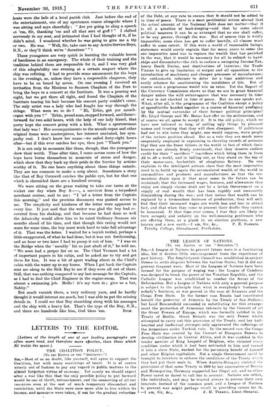LETTERS TO THE EDITOR.
[Letters of the length of one of our leading paragraphs are often more read, and therefore more effective, than those which fill treble the space.] THE COALITION POLICY.
[To rue EDITOR OF THE " SPECTATOR.")
8111,—Most of us no doubt, like yourself, will agree to support the Coalition, but with many searchings of heart. It is of course utterly out of fashion to pay any regard in public matters to the almost forgotten virtue of economy. Yet surely we should expect after a war like this that the only possible policy to put forward would be one of thrift, retrenchment, and the conserving of all our resources even at the cost of much temporary discomfort and restriction, until the State were once more able to live within its • income, and measures were taken, if not for the gradual reduction • of the Debt, at any rate to ensure that it should not be added to in time of peace. There is a most pestilential notion abroad that the actual amount of the National Debt does not matter—that it is all a question of book-keeping—and that by some adroit political measure it can be so arranged that no one shall suffer, or be any poorer, through the war. But of ()course this is wildly impossible; some class has got to suffer heavily, all classes must suffer to some extent. If this were a world of reasonable beings, statesmen would surely explain that for many years to come the one imperative need was to replace the wealth that has perished in the war, that it would be necessary for all to submit to hard- ships and discomforts—the rich to endure a swingeing Income Tax, heavy Death Duties, and deprivations of luxuries; the Trade Unions to give up limitation of output and all opposition to the introduction of machinery and cheaper processes of manufacture; the enthusiastic reformer to defer for a time ambitious and costly schemes for ameliorating the conditions of life. But of course such a programme would win no votes. Yet the Report of the Currency Commission shows us that we are in great financial danger unless the wild extravagance that was necessary in time of war is not checked in time of peace. But no one speaks out. What, after all, is the programme of the Coalition except a policy of spendthrifts banded together in a course of financial profligacy by the mutual surrender of their former political principles? Mr. Lloyd George and Mr. Boner Law offer us the millennium, and of course we all agree to accept it. It is the old policy, which we have now followed so long, of calling ugly things by pleasant names and trusting that they will then disappear. If politicians had not to win votes they might, one would suppose, warn people of the serious position ahead. But as a rule they are much more congenially employed in explaining to cheering orowds of artisans that they are the finest fellows in the world (a fact of which their hearers are already firmly convinced), that they deserve endless credit for their " sacrifices " (sacrifices which bring them in from X2 to ..e8 a week), and in ladling out, as they stand on the top of their motor-cars, bucketfuls of oleaginous flattery. No one explains to the intelligent artisan class that the most imperative need is to build- up again the accumulated wealth of the world in commodities and products and manufactures eo that the tre- mendous drain upon it that must oome in the future can be sustained; that the increased wages, bonuses, and allowances they enjoy are simply claims dealt out by a lavish Government on a supply of real wealth that has been rapidly and necessarily diminishing during the war; and that unless that wealth can be replaced by a tremendous increase of production, they will only find that their increased wages are worth less and lees in actual fact, and that when they come to present their drafts they cannot be honoured. If that time ever comes, I fear they are likely to turn savagely and unfairly on the well-meaning gentlemen who are offering them, as a plank in an election platform, a new heaven and a new earth.—I am, Sir, &o., P. E. ROBERTS. Trinity College, Glenalmond, Perthshire.










































 Previous page
Previous page